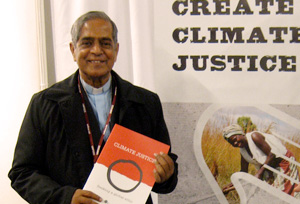
Bishop Gomes, Auxiliary Bishop of the Archdiocese of Dhaka, Bangladesh President of Caritas Bangladesh being part of Caritas climate justice campaign
Credits: Caritas
By Bishop Theotonius Gomes CSC, President of Caritas Bangladesh
One essential aspect of the mystery of the human person is its union of the earthly body and the heavenly soul, a union on earth destined for eternity.
On earth, the body has to be a true home for the eternal spirit; in eternity the soul has to be home of the risen body.
On earth, food assists the body in its essential function to keep “body and soul together” towards the fulfillment of that mystery of the human person.
Thus ‘food security’ is hardly a mere earthly affair, it has eternal overtures.
The Lord’s Prayer is no common petition. It is the prayer for the coming of the Kingdom of God. In it we pray for the “daily bread”, the everyday food of the poor leading to the eternal bread of tomorrow for all.
Scripture refers to food as the basic earthly need:
The bread of the Eucharist points to the inner holiness of this earthly gift as it is offered for all in immolation. It is a perennial sacrament for the earth to continue the visible incarnation of the Word of God under the lasting sign of food, and to show that the life of all creation achieves fulfillment in the giving and receiving of one another as food for the body and the spirit. All created things have the natural destiny to pass away in death. Jesus has redeemed that natural passing away into its lasting spiritual gain by making it a sacrificial giving for others as food for life. Life is not to be taken away; but life can be given away as life-giving nourishment. The inner destiny of all creation is to be food for others, as is the destiny of God in the Incarnate Son. Food has a practically spiritual purpose for humanity in as much as it is needed to keep our soul and spirit living in the body on this earth; and our body secured by daily bread is in a secure position to let God’s spirit function in the body toward resurrection into eternal life. Lack of food for the poor, especially large numbers dying of hunger, is the most “un-eucharistic” situation on earth. This is a darkness on human civilization in our advanced times. Food Security, a material affair, has a great spiritual task at hand. Fasting is penance toward partaking food and other earthly goods in the spirit of “the poor” in “satisfaction”, fostering the desire for sharing these with the poor, to which the rich are called. All our poverty and riches become holy things in such a process. We may devour food in greed; we can eat it gently and “be filled”; we are to taste it carefully to see “how good” it is. We need to inculcate a culture of tasting our food, to understand the taste of the food of the poor. The poor partake of food under the sign of “fasting”, shunning away from devouring it, gently filled, attentive to tasting the goodness thereof. Food is the simple joyful need of the simple people for a simple civilization on earth. In all ages, and even in our times of great industrial and technological advances, great numbers of peoples live in an ambience of soil, air, water and vegetation for an agriculture concerned with security in food. The many poor on earth belong to and are restful and secure in a food based agricultural ambience; the rich in fact take this food-based agricultural gift for granted. Secured with food, all cultures and development can flourish rightfully and harmoniously, within the science of God and mankind’s industry. The founding task in the face of the present crisis of adverse and unjust situations of climate change is to settle properly on secured food-based agriculture, providing the gentle assurance for all other cultural advances. The inner flaw in the present overwhelmingly industrial and technological revolution has been that it forgets in the process the primacy of food security as the foundation of civilization. The simple living in the ambient of land, air, water, vegetation, food and the “poor” is what we need to affirm as humanity’s lasting civilization. Indeed Bangladesh and the so-called poor nations, in fact all nations with the poor as important citizens therein, do bear witness to a culture of that simple living and simple religiosity in the inner spirit. It is the de facto larger situation on our earth. We may not run away from it. |
